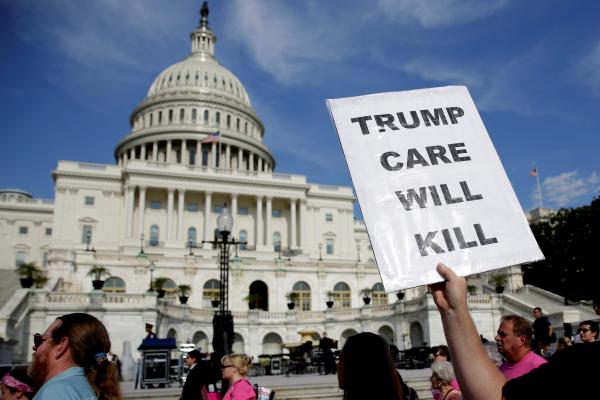As Congress returns and as leaders of the Senate and House continue their desperate search for ways to pass their health and budget proposals, I have one simple question for those whose votes will decide these matters: Is this really why you came to Washington, to take health care from the sick and food from the hungry?
I hope and believe their answer is no. However, the health and budget proposals before Congress will do just that. They make devastating cuts to health care and nutrition for families with the fewest resources and power to fund massive tax cuts for those with the most resources and power.
There is no popular mandate for these upside-down policies and priorities. Members of Congress pledged to cut poverty, not the safety net. President Trump campaigned against cuts to Medicaid, stating that the House bill was too “mean “and the Senate legislation needs more “heart.” However, the Senate proposal, according to the Congressional Budget Office, would increase the number of people without health insurance by 22 million in 10 years. This legislation would cap and cut the Medicaid program over time by more than 25 percent, reducing essential care for poor families, pregnant women, people with disabilities, and patients in nursing homes.
The administration’s budget and House proposals would cut SNAP, formerly known as food stamps, by 25 percent, hurting seniors, children and parents who struggle to put food on the table. The administration’s proposed budget reduces development assistance to poor countries by a third, eliminates international food aid, and cuts global health funding for H.I.V./AIDS and malaria, increasing hunger at a time of famine and denying lifesaving medicine and care to the poorest people on earth.
Over this recess, legislators whose votes will be decisive should listen to their constituents — and their consciences. They should also hear the appeals of religious leaders who have united in a “Circle of Protection” to defend the lives and dignity of the “least of these” (Mt 25) in the health care and budget debates. The U.S. Catholic bishops have warned the Senate legislation is “unacceptable” because it will “wreak havoc on low-income families and struggling communities.” The religious community brings not only moral principles to this debate, but also everyday experience caring for the sick, feeding the hungry, sheltering the homeless, and picking up pieces of a broken health care system.
In more than 30 years of advocacy at the intersection of faith and public policy, this is the starkest choice confronting Congress. I come from a bipartisan family and learned at an early age that people express their faith in diverse ways and different parties. Along with many others, I have worked with both Democratic and Republican leaders to strengthen and improve Medicaid, the Earned Income Tax Credit, food stamps, and international development and H.I.V./AIDS assistance. These are hard-won achievements that required cooperation and compromise across party lines for the common good.
However, I have never seen the partisan and ideological isolation and dysfunction of Washington threaten poor families so seriously and directly. Republican leaders can call it “repeal and replace,” giving states “flexibility,” offering consumer “choice,” getting rid of “waste and abuse,” or “priming the pump,” but Matthew Dowd, a former George W. Bush advisor, made clear “the choice is do you take $1 trillion and help the poor, and vulnerable, and working class in the country in their health care … or do you take the $1 trillion and return it to basically the wealthy of the country?”
The president and Republican leaders should turn away from this divisive one-party search for a political victory that will be a terrible loss for so many of our neighbors. They need to find ways to work with Democrats to address genuine problems of costs, coverage and conscience in the implementation of the Affordable Care Act. Democrats should resist the temptation to simply enjoy Republican divisions, disarray, and potential defeat. They should be ready to offer substantive policies and make hard choices to actually assure decent affordable health care to all in a society with deep political, ideological, and economic divisions.
At this time of policy chaos and preoccupation with presidential tweets, it is worth remembering that less than two years ago Congress united to applaud Pope Francis’ call “to defend and preserve the dignity of your fellow citizens in the tireless and demanding pursuit of the common good.” Last May, President Trump met and promised Pope Francis, “I will not forget what you said.” With his strong words and humble ways, Pope Francis reminds all of us, “the measure of the greatness of a society is found in the way it treats those most in need, those who have nothing apart from their poverty.” Whether the president, members of Congress, and the rest of us heed these words will be a fundamental moral measure of who they are as leaders and who we are as a nation.
This piece originally appeared at America.
Got something to say about what you're reading? We value your feedback!






